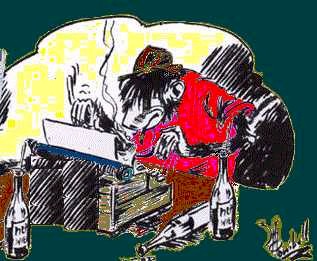Brain Farts and Donkey Bridges
A great deal of background understanding is often required to successfully convey the original flavor and meaning of a story from another tribe. Without the vibe, much is lost.
On the other hand, it is the unexpected twists and turns that give most tales their appeal. This much seems to be common across all cultures. It is the capability of the human mind to spot the strange and the unconventional that makes the difference.
Most of us appreciate this kind of warped thinking – as long as it is harmless. Unlike the person1 who became so upset in church that he jumped up and publicly protested his innocence, we seem to know where to draw the line between what is real and what not.
Or do we?
The Cul-de-Sac Conundrum
There is a class of problems that cannot be solved by looking at the facts alone. Often there is insufficient data, some crucial details are missing, there are too many variables to consider, or the system is dynamic and we do not have an adequate understanding to model its behavior. Unfortunately for us, most human problems are of this nature.
Simple multiplication gives us a good example. Although it’s a tedious exercise, most people will be able to multiply 167285276699 by 19965746109787 without the help of a calculator. However, if presented by the problem to split up the number 3339975362477701126953113 into its prime factors, everyone is toast. There simply is no easy way to do so.
Everything we know about securely doing business on the Internet is built around the irreversible nature of this problem. Worldwide we are literally entrusting billions of dollars in transactions to the RSA encryption algorithms used on the web, algorithms which are based upon the non-reversibility of multiplication. Even the US government is in on this one, and uses several methods based upon this same principle to encrypt their classified stuff.2
There is a dirty little secret, though. Until now, no one has been able to prove that no solution for this factorization problem would ever be found. In other words, we are entrusting a large part of our economy, plus our national security, to methods that can at best be presumed safe. No wonder polls show that more than 76% of Americans are religious.3
How we Cope with Reality
Is this a significant oversight? Well it depends.
Very few world governments truly considered large-scale terrorism imminent until 9/11, while it took the threat of SARS to initiate a period of unparalleled cooperation between many different nations.
Risk is a strange animal. As long as we can consider our chances statistically, very few people will have a problem with the fact that airplanes fall or that bad things happen. Under risk of catastrophe we have traditionally bundled things such as earthquakes and hurricanes, but totally ignored the unthinkable such as terrorist acts, total system failures, or major environmental disasters.
Those things happen to other people, not to us. When it becomes clear that we are next, our mindset changes significantly and we tend to take immediate action. The story about the guy who misunderstood the sermon as a personal attack appeals to our sense of humor when we hear it for the first time. However, the joke’s off when our own future is at stake.
As these examples indicate, we are selective in what we consider important enough to warrant our attention. Living in a reality that contains more variables than we can possibly consider, we are forced to judge and to choose based upon insufficient data. It comes with the territory.
Deliberation and Learning
Although we have no choice in the matter, we are built for this. Our brains have an uncanny ability to make sense of our surroundings, and to act upon insufficient data. Foremost amongst our survival traits, is our ability to panic and to flee.
But whereas animals and even insects can learn through simple association, humans routinely take this ability a whole lot further. Almost effortlessly, we can construct links between existing knowledge and new information, resulting in the new data being remembered much easier. No wonder the Internet has been such a success – it has been a natural extension of how our brains work anyway.
Beyond learning, in humans the novel association of concepts in new and fresh ways also leads to humor and to creativity. These emerging properties of the human mind are what make us so different from our tree-bound relatives.
Logic and Faith
We trend to do things a bit differently when it comes to “real” life, where we have to judge and choose based on incomplete evidence and rely on our limited insight and reasoning ability. Here things are much more serious, and we do not find fresh thinking nearly as appealing as in environments conducive to comedy, art or learning.
Sure, we invite new theory - subject to peer review (in the sciences), or from people we trust (in business) – but credibility is everything. It takes a long time to build, and it can be very quickly lost. Once your credibility is shot, you can forget any future contributions to the human race. Then you will have to take your rightful place amongst the sinners and the outcasts of modern society.
The Need for a New Kind of Business Intelligence
But here’s the rub: Just like the pilots of Spaceship One, we have to fly without knowing if it’s truly safe to do so. That is the paradox we are all faced with – it is dangerous to be alive. After all, one could perish.
The same thing applies to business. We have to plan and act, even though we are unsure if our strategies will get us where we hope we are going. For that very reason, some have developed tools4 to help us measure and correct our flight paths as we go.
But one thing still appears missing from most of our modern business landscape – the ability to be self-critical. Maybe that is why so many Martha Stewarts and Kenneth Lays land in hot water. It is highly unlikely that they are so much worse than the rest of us; they are just the few who got caught. (Be careful now, before you pick up that stone...)
Wisdom is hard won. Private as well as business knowledge comes at a price. And it takes us a long time to sort out what is important and what not. Maybe that is why we find it so hard to consider unfamiliar options.
As global change accelerates, so the need increases to find alternate ways to do business. But we are hampered by our very nature, and are loath to consider stuff that question and contradict our own set of beliefs. Not that long ago our society thrived through the banding together of the like-minded, while we enslaved others.
Today it is well understood that we can actually make more money if we hire people of diverse cultures and backgrounds. Business is global, so this physical diversity is helpful. It also brings diverse opinions and modes of thinking. Some of which we are not always at ease with.
If only they knew. If business would have paid some attention to such thoughts and insights they could have made some serious money. There would have been no large Internet brokers if Merrill Lynch was not asleep at the wheel, neither would Kodak have taken so long to embrace digital photography. And Xerox…mercy…will there ever be any hope? At least, IBM belatedly understood when it embraced the Open Source movement. But will the entertainment industry ever comprehend that it is setting itself up for failure by threatening it’s own clients?
As Christensen5 has shown, in spite of our best efforts (often because of our best efforts) we fail to see the disruptive innovations that could harm our business. Maybe its time that we appoint a few people to ask those questions we always seem to fail to ask ourselves. To stir up the pot: The hoi polloi versus the subject matter experts.
The same kind of thinking that makes us laugh is what we are so desperately in need of today. It is time that we reappoint the court jester – to the Corporate Strategy Team. And we need to find ways to really mine the creativity of our employees.
The answer has been working for us - but it knows that it’s still unsafe to speak. When our employees are finally able to tell us what’s on their minds, no matter how strange that might sound - only then we will be able to compete in the business of tomorrow.
----------
Notes:
- This is apparently a true story. During this particular sermon the minister was talking about the sinful nature of man, when it all became too much for the poor gentleman. He jumped up, accused the cleric of talking about him, grabbed his coat and left.
- Just for the record, large numbers can be factored. It is only because our current methods are so crude that we basically have to run through all the possible combinations in order to unlock the keys. Therefore, by arbitrarily adjusting the size of the keys, we can assure that our secrets stay safe longer. Even for the fastest computers we have today, it is quite easy to present them with a problem that will take them 20 years, or more, to figure out!
- According to the American Religious Identity Survey (ARIS) conducted in 2001, with a sample size of 50,000 Americans.
- For Instance, the Balanced Scorecard – developed by Kaplan and Norton
- Clayton Christensen: The Innovator’s Dilemma.
Jan Tik





No comments:
Post a Comment